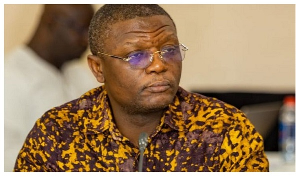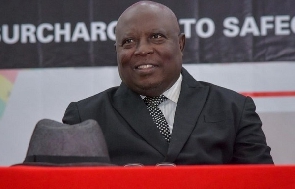Accra, Feb 25, GNA - The Inspector General of Police(IGP), Mr. Patrick Kwarteng Acheampong, says when ever a crisis of a national dimension occurred which was directly connected to an individual or group or had to do with two or more sides, it paid to objectively analyse and assess issues in order to find a true solution.
He said, always trying to find somebody to blame was not necessarily going to provide the answers that might have to be addressed. Speaking to journalists during a press briefing on recent demonstrations against the passing of the Representation of the People's Act Bill(ROPAB) into law, the IGP recalled that since the inception of the fourth Republic Constitution and the promulgation of the Public Order Act 1994, Act 491, most public events had taken place peacefully. He said demonstrations had largely been peaceful due to effective collaboration between leaders of these demonstrations and the police on issues such as the nature of the demonstration, the routes to be used and other details, adding that organizers were often quick to disown "a few recalcitrant demonstrators".
"This is due to the fact that most organizers of demonstrations and the police do respect the laws of this country and respect themselves as exemplary citizens."
Touching on the ROPAB demonstrations, he said whilst the first anti-ROPAB demonstration which was held on 14 February 2006, went on smoothly without event, the second one which was held on February 21 2006 led to acts of disorder by some demonstrators, despite the assurances of the organizers. He said those that got injured as a result included innocent persons, police officers and "my Deputy Inspector-General in-charge of Operations Dr. K.K. Manfo".
Mr. Acheampong referred to the public order act and explained that every action taken by the police was with respect to the act, adding that they did not just act anyhow.
Touching on the need for national security, peace and development, Mr. Acheampong said the most important thing was not weather the police or demonstrators were to blame for the incidents but rather for citizens and all stakeholders to objectively look into such matters and find solutions.
He said organizers of demonstrations always had to consider some basic factors such as the limits of tolerance which a Police contingent could endure in the face of unjustified provocation and attack, the ability of organizers to control demonstrators, the likelihood of frequent demonstrations raising tensions and frustrations, among several others.
The IGP said apart from these issues, demonstrations could have a great toll on the Police Administration.
He said this kind of toll could be seen in the physical logistics involved in moving over 1500 Officers from Accra, Tema, Eastern, Central and Volta Regions through some principal streets of Accra "for so many hours", officers left behind in offices and duty points who sometimes had to do a straight 24 hours, fuel and food cost, amongst several others.
"How does it affect our ability to perform other core functions such as prosecutions, response to emergencies, patrols etc." The IGP urged individuals and organizations not to make demonstrations a daily occupation.
"Let us commit and rededicate ourselves to orderly and peaceful demonstrations and avoid provoking law enforcement agencies to the point of engagement," he said.
Dr K.K. Manfo, Deputy Inspector General of Police in Charge of Operations, recounting events that led to the police action, said the accommodating nature of the police during the demonstration, could be seen in their overlooking the fact that the demonstrators, in spite of taking off at 1000 hours instead of 0800 hours, were allowed to take off without incident.
He said the police only put out fire they had set to a car tyre in the middle of the road at a point without hindering anybody, adding that even an offender was released although he had intended to cause confusion by burning some objects on the road. The Deputy Inspector General of Police said it was when the demonstrators got rowdy and begun to throw stones, with a big one hitting him on the chest around the Castle that the police reacted. He said even when he had gone to the Police Hospital for treatment as a result of the incident, he returned to the scene of the demonstration to ensure order.
Advising the public against disorder, he said "if I had not straightened up, the stone could have hit my head and I could have been dead. Don't let us justify criminality. It is wrong," he said. A demonstration held on February 21 against the passing of the REPAB into law resulted in clashes between demonstrators and the Police, causing injury to both demonstrators and police men including Dr K.K. Manfo.
Whilst the demonstrators have accused the police of violating their rights by being unnecessarily tough on them, the police on the other hand say they only resorted to the use of "minimum force" when they were pushed to the wall and had no other choice. Fourteen leaders of the demonstration have been granted bail after being arrested as a result of the incidents
General News of Saturday, 25 February 2006
Source: GNA
















